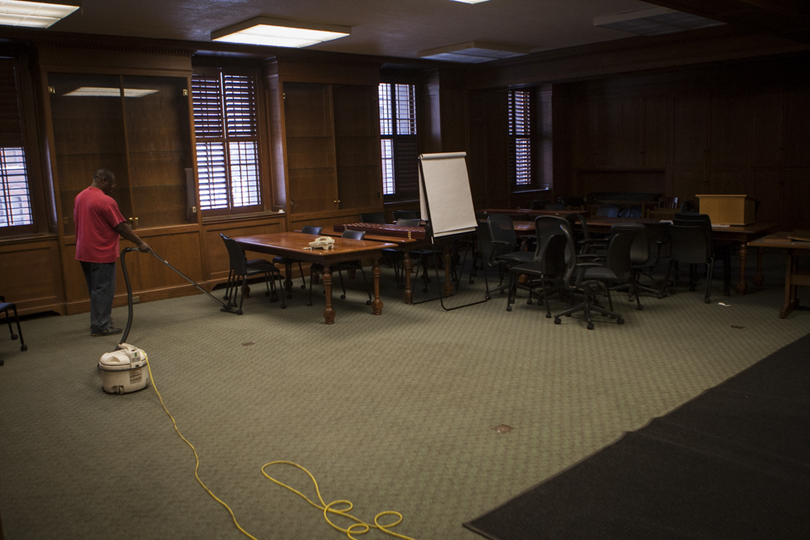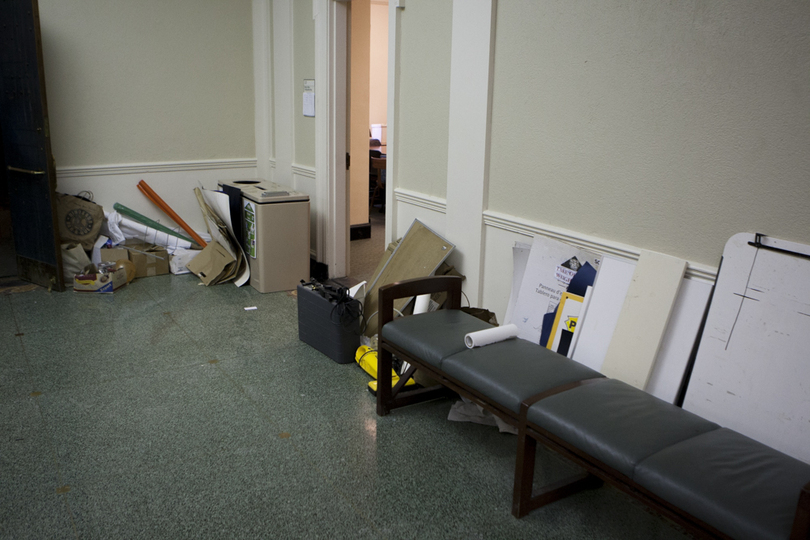Pipe bursts in Maxwell Sunday morning; water causes ceiling damage
UPDATED: Dec. 17, 8:59 p.m.
After a window was left open for several hours, a water pipe burst Sunday morning in the Maxwell School of Citizenship and Public Affairs, flooding several classrooms and administrative offices.
The Syracuse Fire Department, members of Syracuse University’s maintenance crew, steam fitters, electricians and five custodians responded to the scene at about 8:45 a.m., said Ray Kowalski, SU Physical Plant’s west zone manager. Michael Wasylenko, professor of economics and an associate dean in the Maxwell school, also responded to the scene. It is unclear how long the water flowed for, but Kowalski said he believes the humidity from the water caused the smoke detector to go off.
“We’ve gotten most of the damage out of there and we’re waiting to see what dries out and what doesn’t,” Wasylenko said. “We’re in a waiting period right now.”
Wasylenko said the timing of the incident was “as convenient as it could have been” with students being off campus for winter break. He added that several classrooms sustained water damage from the burst pipe, which could have disrupted final exams if it had happened a week earlier because students would have “nowhere else to go.”
The open window was located in a study room on the second floor of Maxwell, Kowalski said. The water traveled from the second floor to the basement and flooded out about eight areas, he said.
Members of Physical Plant were concerned that the ceiling above the historic Maxwell Auditorium might cave in from the damage, but Kowalski said it had little damage and is drying up quickly. He added that the ceiling in the reception area outside of the auditorium is also wet and may need to be repainted.
“The only places of concern are the adjacent areas in the first floor and in the basement, which has a drop ceiling with tiles that need to be replaced, but it’s very easily taken care of,” Kowalski said.
After the fire department responded to the scene, Kowalski said supervisors from auxiliary maintenance areas checked out smoke and fire detectors, while custodians removed carpeting to dry. He added that electricians also removed several light fixtures that were filled with water.
Kowalski said his first concern was to prevent mold growth by checking how much water collected underneath the carpet, but added that the carpet has concrete underneath it sealed by tile, which helps contain the water.
Custodians used Physical Plant’s flash flood cart, which Kowalski said has a water extractor with a pump, fans, antimicrobial solution and tarps to prevent damage to files and equipment. He said steamfitters stayed at the scene until about 2:30 p.m. and a custodian stayed until the night shift began.
“The response of the physical plant staff was terrific, they must have had a dozen people vacuuming up the water,” Wasylenko, the associate dean, said. “They got all the equipment here in record time.”
Wasylenko said the water isn’t completely dry, but damp and dry enough that it isn’t “standing water.” He said the only immediate damages are on the ceiling and carpet that needs to be re-glued in some areas.
All damages are expected to be repaired before students return from winter break, Kowalski said. He also reminded both students and faculty to make sure they leave office spaces responsibly, adding that they have seen similar situations in the past – most of them in historic buildings.
Said Kowalski: “We were lucky, but we may not have been as lucky if we hadn’t responded so quickly.”
Published on December 16, 2013 at 3:57 pm
Contact Annie: apalme05@syr.edu







